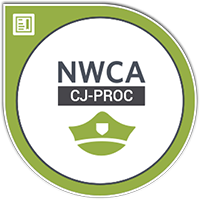Criminal Procedure Specialist
Criminal procedure focus on the actions or inactions taken by law enforcement, the legal system and the penal system throughout the investigation and adjudication of a crime. Focusing primarily on the protections of the accused as dictated by the Fourth, Fifth and Sixth Amendment to the US Constitution, this course covers the various ways in which the US criminal adjudication system defines the roles of police, prosecutors, grand juries, defendants and victims. At the center of the American criminal justice system lies the criminal court system that serves to ensure our community and our society remain protected from both criminals and the law itself. With its unique procedures and processes, the American criminal courts are designed to ensure we have a fair and balanced system for criminal prosecution that focuses primarily on the rights of the accused.
The legitimacy of American criminal jurisprudence lies in the function and fairness of its criminal courts and students will examine exactly how these institutions uphold the most basic of constitutional rights and values in their daily application. The course takes students through the often-controversial and complex procedures balancing individual rights against the protection of everyone as it pertains to search and seizure of individuals or property, due process requirements for the accused and how these requirements have evolved over the last century through landmark cases interpreted by the US Supreme Court that produced Miranda rights, Terry stops and other common-place considerations necessary throughout the criminal process. The program offers students an overview of the criminal justice system and its processes.
Program Objectives
After completing this program, learners will be able to:
- Distinguish between the due process and crime control perspectives including the impact on criminal procedure
- Examine what can be done when constitutional rights are violated including civil, criminal, and non-judicial remedies
- Examine how the Fourth, Fifth, and Sixth Amendments protect individual rights
- Analyze criminal procedure prior to trial describing the roles of prosecutors, grand juries, and defense attorneys
- Analyze criminal procedure from first contact to appeals
- Define terms related to criminal courts and the impact of history on the criminal courts
- Describe how laws are created
- Explain the relationship between laws and the court systems
- Analyze the court process from the committing of a crime through post convictions
- Examine how courts operate, specifically the juvenile courts
- Differentiate the people involved in the court system
Certification Opportunities
After completing this program, learners will have the opportunity to take the leading national/industry-recognized certification exam(s) essential to entry-level employment in this fast-growing field.
 |
National Workforce Career Association (NWCA) Criminal Procedure (CJ-PROC) |
Optional Volunteer Externship Opportunity
Learners who complete this program are eligible to participate in an optional volunteer externship opportunity with a local company/agency/organization whose work aligns with this area of study in order to gain valuable hands-on experience. As learners progress through their eLearning program, an Externship Coordinator will reach out to coordinate placement.
Note: Additional documentation including health records, immunizations, drug-screening, criminal background checks, etc. may be required by the externship facility.
Requirements
- High School Diploma or GED
Program Details
- Mobile-Ready
- National Certification Opportunity
- All Textbooks & Materials
- Laptops Available
- 24/7 Learner Support
- Certificate of Completion
- Optional Externship Opportunity